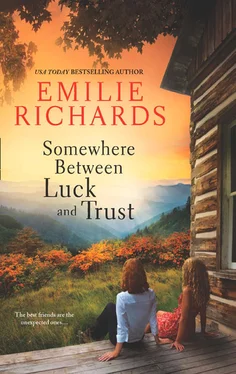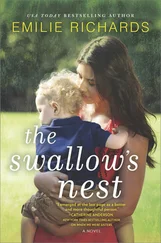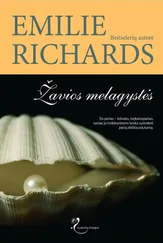“I know you did. It must have been a hard time for you.”
“What happened next?”
“Speeding to elude arrest is a Class H felony. Luckily for me, my passenger eventually recovered, or things would have been different. But the courts can, if they choose, discharge first offenders under the age of eighteen. I was seventeen when this happened, and even with my many problems, I’d never been arrested. So I was given a year’s probation, otherwise known as a wake-up call. I did community service, started going to AA meetings, finished high school somewhere else and kept out of trouble. Eventually all record of my offense was expunged.”
“You got off then. What does that have to do with teaching at the prison?”
“It wasn’t that simple. My mother lost her job over it, something I still can’t forgive myself for. But I got off, Cristy, because I was lucky. Pure and simple. Not because this was a little infraction, or because I’d been a model citizen. I screwed up big-time, and somehow I was given a chance to have a normal life anyway. It’s been a good life, too, but you know what? I still feel like I owe the universe. I figure teaching at the prison is a way to show I’m thankful for not being a resident there. And a way to give back to everybody who wasn’t as lucky as I was.”
“Like me.”
“Like you.”
“I was twenty-two when I was arrested, and I had a prior conviction.” Cristy chewed on a French fry, then another before she added, “I deserved the first one.” She wanted Samantha to know that, to see she was willing to take responsibility when she should.
“Shoplifting?”
“I was still in high school, right before I dropped out. There was a group of girls I liked, girls like me who didn’t really fit in, and they had this unofficial club. They called themselves the Outsiders. To join I had to go into the hardware store down the street from school and shoplift something. Anything, it didn’t matter, except it had to be over a dollar. One of them waited outside to make sure I didn’t go up to the counter and pay first.”
When she didn’t go on, Sam asked, “So you went along with it?”
“I was a preacher’s kid. By then my parents thought I was beyond redemption, but I’d never done anything illegal, not anything like that. So I was scared but determined.”
“And you got caught?”
“I took the cheapest thing I could find on the aisle farthest from the counter. It was a little pocket tape measure. I figured I would go in later when nobody was watching and tell the clerk I’d walked out by mistake without paying for it, and give him the money. I thought that would make it okay. I stood there for ten minutes trying to make myself slip it in my pocket, and finally I did.”
Samantha waved a French fry. “Uh-oh.”
“Turns out the manager had been watching me. He had figured out what the Outsiders were up to, and he’d noticed the girl waiting outside. So they stopped me when I had one foot out the doorway and called the sheriff. I think they hoped nobody else would try to shoplift after that. As small as it was, it was still on my record when...” She didn’t go on.
“When you were arrested the next time.”
Cristy nodded. “It didn’t help.”
“I guess not.”
They fell silent. Cristy finished half her hamburger, but she realized that was the best she could do. “I’m sorry, but I don’t think I can eat the rest of this. Thank you for buying it for me.”
“You’re very welcome.” Samantha flashed her extraordinary smile, and for a moment Cristy felt warmed by it.
“I noticed a Target in the strip mall over there.” Samantha nodded toward the far door. “That’ll give us a chance to stretch our legs before we get back on the road. You’re going to need some new clothes until you gain back some of the weight you lost. Let’s do a little shopping.”
“I’m sorry, but I just don’t get it. You’re being so nice to me. And you have no reason to.”
“Reason?” Samantha considered. “Here’s my reason, Cristy. We’ve just determined that I was lucky and you weren’t. So let me make a little good luck for you now. It’s as simple as that. Don’t you deserve it?”
Cristy didn’t know. She honestly didn’t know what she deserved anymore. And because she didn’t, she just didn’t answer.
Chapter Three
EVERY DAY AT BCAS was “one of those days.” Georgia knew she was lucky to thrive on variety and problem solving. Even so, by the time the afternoon faculty meeting drew to an end, all the blood had been leeched from her body.
The faculty had come with the job, which Georgia had gotten after the committee’s first choice left the school board high and dry. Unfortunately that woman had also gifted the school with a handful of teachers who saw BCAS as a demotion, even a punishment for infractions they had committed in their lengthy careers.
Passive-aggressive behavior reigned. In classrooms that needed constant stimulation to engage students’ attention, these teachers inevitably showed videos, or assigned long passages to be read silently. They used lesson plans that probably hadn’t worked in former classrooms, and talked about not coddling students. In the future Georgia might be able to replace them, but this year, for better or worse, they were hers. Boring students to death was not a good enough reason to send a teacher packing.
Now, at meeting’s end, she stood to stop one of the worst teachers in the middle of a monologue that was putting the rest of the faculty to sleep. Jon Farrell, a man tantalizingly close to retirement, was moonfaced and pink-cheeked. What was left of his gray hair was trimmed in an old-fashioned flattop stiffened with wax. Jon’s educational theories were of the same vintage.
“Thank you, Jon,” she said. “But I’ve got to cut you off now.” She saw gratitude on the faces of teachers across from her. She insisted the faculty sit in a circle so they could see each other. It wasn’t a popular decision with some, but others appreciated the more democratic approach.
“I’m cutting you off,” she continued, “because I think it’s clear from things that have been said here today that our mission is still a mystery to some of you. I want you to consider carefully what I’m about to say.”
She got to her feet and began to walk around the circle, speaking slowly and deliberately, making eye contact with each willing person there.
“We’re here so students who have no chance in a regular classroom will prove they can excel in ours. We’re not here to teach down to them. We are here to teach up to them. Some of these students are extraordinary. They’re gifted and creative. If we can get through to them, in the not too distant future they’ll be the names we see on award-winning movies and books. Among them might well be the person who finally finds a cure for cancer.”
She stopped, because she was at the end of her round. The room was silent.
“Did anybody think to interrupt me just then?” she asked.
The teachers looked puzzled.
“Did you have time to pass a note or engage in conversation with your neighbor? Did you have time to check your cell phone or text a friend?”
No one answered.
“You didn’t, because I was in your face. I was right there watching you. Not standing over you, but engaging you, right? We locked eyes, at least most of us did. And because we did, you listened harder. You knew listening was important, because most likely whatever I said was going to come up again.”
Jon Farrell’s sneer was reflected in his voice. “You want us to walk in circles?”
“I want you to interact, Jon.”
“None of my kids are going to cure cancer, I can tell you that for sure. Most of them have failed at everything they’ve done. That’s why they’re here.”
Читать дальше












